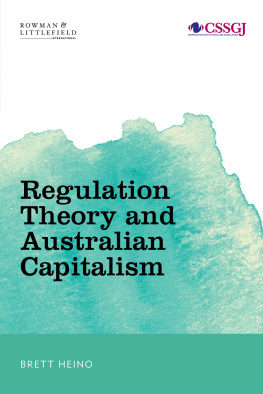ROADS TO POST-FORDISM
Roads to Post-Fordism
Labour Markets and Social Structures in Europe
MAX KOCH
University of Ulster, Northern Ireland
First published 2006 by Ashgate Publishing
Published 2016 by Routledge
2 Park Square, Milton Park, Abingdon, Oxon OX14 4RN
711 Third Avenue, New York, NY 10017, USA
Routledge is an imprint of the Taylor & Francis Group, an informa business
Copyright 2006 Max Koch
Max Koch has asserted his right under the Copyright, Designs and Patents Act, 1988, to be identified as the author of this work.
All rights reserved. No part of this book may be reprinted or reproduced or utilised in any form or by any electronic, mechanical, or other means, now known or hereafter invented, including photocopying and recording, or in any information storage or retrieval system, without permission in writing from the publishers.
Notice:
Product or corporate names may be trademarks or registered trademarks, and are used only for identification and explanation without intent to infringe.
British Library Cataloguing in Publication Data
Koch, Max
Roads to post-Fordism: labour markets and social
structures in Europe
1.Labor economics 2.Social structure 3.Labor economics
Europe - Case studies 4.Social structure - Europe - Case
studies
I.Title
331.01
Library of Congress Cataloging-in-Publication Data
Koch, Max, 1966
[Arbeitsmrkte und Sozialstrukturen in Europa. English]
Roads to post-Fordism: labour markets and social structures in Europe / by Max Koch.
p. cm.
Includes bibliographical references and index.
A translation of: Arbeitsmrkte und Sozialstrukturen in Europa. Wiesbaden: Westdeutscher Verlag, c2003.
Originally presented as the authors Habilitationsschrift (Freie Universitt Berlin, 2002) under the title: Wege zum Postfordismus.
ISBN 0-7546-4308-5
1. Labor market--Europe. 2. Industrial policy--Europe. 3. Europe--Economic conditions. 4. Europe--Social conditions. I. Title: Labour markets and social structures in Europe. II. Title: Labor markets and social structures in Europe. III. Title.
HD5764.A6K64 2006
331.101--dc22
2006003908
ISBN 9780754643081 (hbk)
Contents
This book is based on my Habilitation (the second doctoral thesis formally necessary for a professorship in the German-speaking world), which was accepted by the Faculty of Political and Social Science of the Freie Universitt Berlin in October 2002. The original German version was published by Westdeutscher Verlag with the title Arbeitsmrkte und Sozialstrukturen in Europa. Wege zum Postfordismus in den Niederlanden, Schweden, Spanien, Grobritannien und Deutschland in 2003. After my move to the University of Ulster, and many discussions of this work for example during the conferences of the European Sociological Association in Murcia and the Industrial Relations In Europe Conference in Utrecht the idea took shape to write a theoretically and empirically updated version in English. Readers who also know the German version will realize that the theoretical body has been streamlined and that some elements such as the section on closure theory have been added. Empirically, the country studies now cover the years from the early 1970s up until 2003 (instead of 1997, in the original version). This has led to greater or lesser reinterpretations of the data material, especially in the cases of Sweden, Spain and Germany.
I would like to thank a number of people and institutions that have made this book possible. First the social sciences team of Westdeutscher Verlag (now VS Verlag fr Sozialwissenschaften) for giving us permission to translate and adapt material from the original German publication. Second the German Research Council (Deutsche Forschungsgemeinschaft), who financed the original study (Project Code KO 1571/22). Third my colleagues at the Freie Universitt, Berlin who critically supported me in conducting the study and during the Habilitation examination. Fourth my colleagues from the ERASMUS/SOCRAT ES network, coordinated by Erasmus University, Rotterdam, which organizes annual intensive courses with themes relevant to the EU, and which facilitated contacts enabling me to conduct interviews in Spain, Sweden, the UK and the Netherlands. Fifth my colleagues and students at the University of Ulster for encouraging me to see through the English version (living in Northern Ireland has also enhanced my European spirit immensely). Special thanks go to the European Studies Research Unit of the Academy of Irish Heritage Culture who paid for the index. Sixth the Department of Social Policy at the University of Lund, where I as a Visiting Scholar finalized the manuscript. For ongoing support and partnership I am grateful to E.
Derry and Berlin, June 2006 Max Koch
CC.OO. Comisiones obreras
CNV Christian National Union
D-Mark German mark
DIW Deutsches institut fr Wirtschaftsforschung
EU European Union
EUROSTAT Statistical Offce of the European Communities
FNV Confederation of dutch trade Unions
FRG Federal Republic of Germany
GATT General agreement on tariffs and trade
GDP Gross domestic Product
GDR German democratic Republic
ILO International Labour organization
IMF International monetary Funds
ISIC International Standard Classification of all Economic activities
LET Ley del Estatuto de los Trabajadores
LO Swedish trade Union confederation
LOLS Ley Orgnica de Libertad sindical
MAC Unidades de Mediacirbitraje y Conciliacin
OECD Organization for Economic cooperation and development
OPEC Organization of Petroleum Exporting countries
OSE Organizaci Sindical Espaola
RCO Council of central Business organizations
SAF Confederation of swedish Employers
SPD Sozialdemokratische Partei deutschlands
SER Sociaal Economische Raad
STAR Stichting van de arbeid
UGT Unin General de Trabajadores
UK United Kingdom
US United states
VHP Union of White collar and senior staff associations
VNO Federation of dutch industry
After the 1970s, all Western European countries moved, at some point, from a period of prosperity and full employment to one shaped by stagnation and a crisis in employment. This is reflected in the academic debate insofar as the idea of a standard career with lower, middle, or higher educational qualifications, the corresponding professional career and pension dependent on the occupational position is now being treated as a thing of the past. It is more common that educational and professional careers are characterized by breaks and gaps; this means many more individuals experience social decline and dclassement today than a quarter of a century ago. In order to come to terms with these developments, since the 1990s, the term social exclusion has come to be very widely used by politicians, policy makers, practitioners and academics. Although various conceptions of social exclusion were being developed as early as the 1960s and 1970s, recent years have witnessed an upsurge in the publication of a wide range of books and articles on the topic. Arguably, the growth in popularity of the term delineates attempts to understand and interpret new patterns of social division, particularly in relation to changing patterns in employment and unemployment, modifications in welfare provision, changing patterns in demographic mobility, both nationally and internationally, and changing definitions of eligibility for a variety of civil rights and duties.









